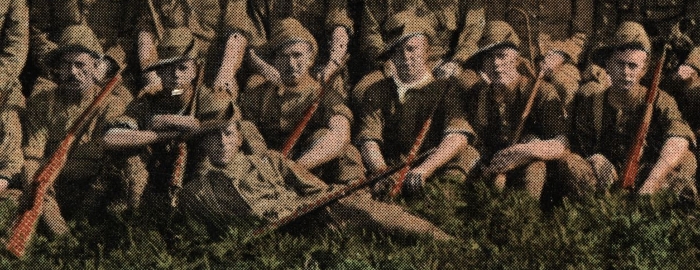Topic: Canadian Militia
Soldiers of The Royal Canadian Regiment at Petawawa, 1912, from a postcard.
Advantages of the Permanent Force
As published in the regimental journal of The Royal Canadian Regiment; The Connecting File, Vol. XXVII, No. 1; Spring–Summer 1955
A booklet entitled "Advantages of the Permanent Force," dated during the year 1912 sates in part that a Private Soldier on enlistment is entitled to a pay of $.70 per diem with an automatic increase of $.10 per diem after four years service.
It goes on to say that in addition to his pay which is $15.00 per month for the private soldier exclusive of deferred pay, a soldier receives the following, free:—
FOOD—A daily ration of 1 pound of read, 1 pound meat, 2 ounces bacon, 1 pound potatoes, 2 ounces beans, 2 ounces jam, 2 ounces butter, 1 ounce cheese, 1/1 ounce salt, 1/3 ounce coffee, ¼ ounce tea, 1/36 ounce of pepper, 6 ounces fresh vegetables.
Quarters, Bedding, Fuel and Light are supplied without payment, but the soldier has to pay for his washing and hair cutting.
MEDICAL ATTENDANT—Soldiers admitted into hospital receive the necessary diet and surgical and medical treatment. If admitted from wounds received in action, from illness contracted on service in the field, or from injuries received during drill or manoeuvre on peace service, free treatment is given. If admitted on account of injuries received in the performance of military duty a stoppage of 10 cents a day is made (including washing). In other circumstances a stoppage of 15 cents is required.
A soldier on joining the Permanent Force may be said to receive in pay, rations, lodging, etc., the equivalent of $1.10 per day which sum gradually increase according to his promotion and length of service. He also receives in addition to the above his deferred pay which in three years amounts to $32.00 and increases with further service.
A soldier also benefits by the following advantages—
(a) Prizes for good shooting, etc.
(b) Refreshments, groceries, tobacco, etc., from Regimental canteen at very low ates.
(c) The use of library, recreation room and gymnasium.
(d) Opportunities at learning a trade.
(e) Cricket clubs, athletic sports, &c., at most stations.
(f) The grant of a furlough, periodically for 21 days, on full pay.


